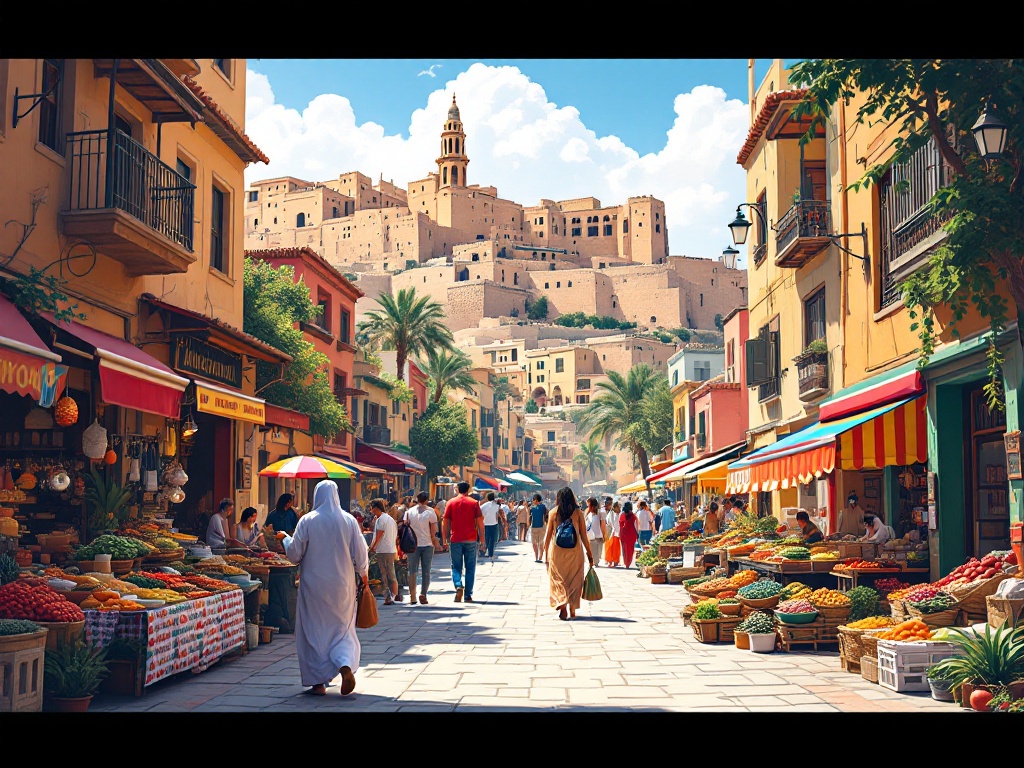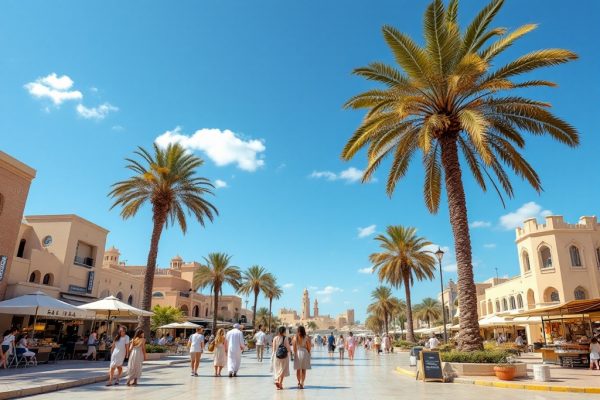Amman: Discover the Captivating Capital of Jordan
Discover Amman, Jordan’s vibrant capital, where ancient ruins meet modern marvels. Explore bustling markets, savor delicious cuisine like Mansaf and falafel, and experience the warmth of Jordanian hospitality. From the historic Citadel to the trendy Rainbow Street, Amman offers a unique journey through time. Uncover the secrets of this captivating city – start planning your Amman adventure today!
Important information

- Amman blends ancient ruins with modern architecture, offering historical sites, lively markets, and warm Jordanian hospitality.
- Key historical attractions include the Amman Citadel, Roman Theater, and Jordan Archaeological Museum, showcasing the city’s rich past.
- Spring (March-May) and autumn (September-November) are the best times to visit Amman for pleasant weather.
- Visitors can enjoy traditional Jordanian cuisine, with Mansaf (lamb in dried yogurt sauce) and Falafel being popular dishes.
- Amman is generally safe, but standard safety precautions are recommended. Dress modestly, especially at religious sites.
The Vibrant Urban Vibe of Amman
Amman, Jordan’s vibrant capital, seamlessly blends ancient ruins with modern architecture. This bustling hub radiates energy while showcasing the country’s rich cultural heritage. Visitors can explore fascinating historical sites and lively markets, experiencing the renowned warmth of Jordanian hospitality. Amman offers a unique journey connecting the past and present.
Downtown Amman: The Historic Heartbeat of the City
Downtown Amman pulsates as the city’s vibrant heart, a captivating blend of traditional markets and historical landmarks. Its energetic street life offers a glimpse into Amman’s rich past and enduring cultural heritage.
Rainbow Street: A Hub of Modern Culture
Rainbow Street, a bustling avenue in Amman, pulsates with trendy shops and cafes. Adorned with vibrant street art, the buildings showcase the city’s modern culture, offering diverse experiences for locals and tourists alike.
This eclectic mix creates a unique atmosphere, making it a popular destination for those seeking a taste of Amman’s contemporary scene. Rainbow Street is truly a must-see.
Souq Jara: A Traditional Market Experience
Souq Jara, a traditional market in Amman, Jordan, vibrates with local crafts and fresh produce. It offers visitors a unique cultural experience, plunging them into the heart of Amman’s bustling marketplace. Here, a diverse array of goods showcases the impressive skills of local artisans, making it a must-see for any visitor.
Amman’s Historical Wonders
Explore Amman’s captivating historical sites. Visit the Amman Citadel atop Jebel al-Qal’a hill for panoramic city views and explore Roman, Byzantine, and Umayyad ruins. Discover the well-preserved 2nd-century Roman Theater, once holding 6,000 spectators. Conclude your historical journey at the Jordan Archaeological Museum, showcasing artifacts from prehistory to the Islamic periods, revealing Amman’s rich past.
The Citadel: A Window into Amman’s Past
From atop Jebel al-Qal’a, one of Amman’s seven hills, the Citadel commands breathtaking panoramic views of the city. Within its walls lie the evocative ruins of Roman, Byzantine, and Umayyad civilizations. Explore remnants of the Temple of Hercules, the Umayyad Palace, and a Byzantine church. The Citadel offers a captivating journey through Amman’s layered past, from antiquity to the present day.
Roman Theater: A Glimpse of Ancient Performances
Amman’s Roman Theater is a striking testament to the city’s rich Roman heritage. Within its well-preserved walls, ancient Romans once enjoyed theatrical productions and gathered for public occasions.
Jordan Archaeological Museum: Unveiling Jordan’s Rich History
Perched atop Amman’s Citadel, the Jordan Archaeological Museum unveils Jordan’s captivating past. Its diverse artifacts illuminate discoveries from neighboring archaeological sites, spanning the Stone Age through the Islamic era. This remarkable collection truly brings Jordan’s history to life.
Amman’s Architectural Marvels
The 2nd-century Nymphaeum, a public fountain, showcases impressive Roman engineering and Amman’s Roman heritage. This once-magnificent structure supplied water to the city and served as a vital public gathering place.
Built between 1982 and 1989, the King Abdullah I Mosque is a modern landmark with stunning Islamic architecture. Its striking blue dome is a prominent feature of Amman’s skyline, and the mosque welcomes visitors of all faiths seeking a tranquil space for reflection.
The Royal Automobile Museum houses the late King Hussein’s unique vehicle collection, offering a fascinating glimpse into Jordan’s modern history from the early 20th century onward. The exhibits include a diverse array of cars, motorcycles, and other vehicles.
Nymphaeum: A Testament to Roman Engineering
Amman’s Nymphaeum showcases the ingenuity of Roman engineering. This public fountain wasn’t merely a source of water, but a testament to their advanced hydraulic systems.
King Abdullah Mosque: A Landmark of Serenity
The King Abdullah I Mosque, with its striking blue dome, is a prominent landmark in Amman, Jordan. Its intricate architecture draws visitors who appreciate both its beauty and cultural significance. The mosque also houses the Islamic Museum, which features a fascinating collection of Islamic artifacts.
Royal Automobile Museum: A Peek into Jordan’s Modern History
The Amman Royal Automobile Museum showcases the late King Hussein’s remarkable car collection, providing a unique insight into Jordan’s modern history. The museum chronicles not only the nation’s past but also the evolution of automobiles. It stands as a fascinating tribute to the Hashemite Kingdom.
Cultural and Artistic Experiences in Amman
Darat al Funun, a vital art center in Amman, Jordan, champions contemporary Arab art. It offers exhibitions, workshops, and educational programs, fostering a vibrant hub for creative expression.
The National Gallery of Fine Arts, also in Amman, showcases diverse modern and contemporary works. Primarily from Jordan and the Arab world, the gallery includes paintings, sculptures, ceramics, and other art forms, offering a glimpse into the region’s rich artistic heritage.
The Jordan Museum provides a comprehensive overview of Jordanian history and culture. It displays artifacts from prehistoric times through the Roman and Islamic periods, taking visitors on a journey through the country’s captivating past.
Darat Al-Funun: A Sanctuary for the Arts
Darat al-Funun, the Khalil Sakakini Cultural Center, is a prominent hub for contemporary Arab art in Amman, Jordan. Residing within three beautifully renovated homes from the 1920s, it offers a unique blend of artistic and architectural significance. The institution is dedicated to promoting artistic expression and fostering cultural exchange.
National Gallery of Fine Arts: Celebrating Creativity
The National Gallery of Fine Arts houses a remarkable collection of modern and contemporary art from Jordanian and international artists. This vibrant hub promotes cultural exchange and fosters artistic expression, providing a crucial platform for both emerging and established talents.
Jordan Museum: Exploring the Nation’s Heritage
Explore Jordan’s captivating history and rich cultural legacy at the Jordan Museum, where exhibits span from prehistoric times to the present day. Discover impressive archaeological treasures, including the Dead Sea Scrolls and Neolithic artifacts. Explore beautiful Islamic art and traditional Jordanian costumes. The museum offers a fascinating glimpse into Jordan’s vibrant past and its evolving cultural identity.
Culinary Delights: A Taste of Jordan
Jordanian cuisine offers a rich tapestry of flavors. Indulge in Mansaf, the national dish, featuring tender lamb cooked in jameed, a distinctive dried yogurt sauce, served over rice and shared communally. Savor falafel, crispy deep-fried chickpea patties, a beloved Jordanian staple. Makloubeh, a savory upside-down rice dish layered with meat and vegetables, is a culinary masterpiece. Don’t miss the creamy hummus, a classic dip made with chickpeas, tahini, and lemon. Enjoy shawarma, thinly sliced marinated meat wrapped in pita, a popular street food. From casual eateries to upscale restaurants, Amman provides diverse dining experiences where visitors can explore these and other local delicacies. For an authentic culinary journey, choose a traditional Jordanian restaurant.
Mansaf and Falafel: Icons of Jordanian Cuisine
Mansaf, often called Jordan’s national dish, features tender lamb cooked in jameed, a fermented dried yogurt sauce. This flavorful combination is served over fluffy rice, creating a true culinary experience.
Falafel, another popular Jordanian food and street food staple, consists of delicious deep-fried balls made from ground chickpeas, herbs, and spices. These convenient and tasty bites, along with mansaf, showcase Jordan’s rich culinary heritage.
Where to Savor Local Cuisine in Amman
Amman, a Middle Eastern food paradise, offers a diverse culinary experience. For authentic falafel and hummus, visit Hashem Restaurant. To savor traditional Jordanian cuisine, Al-Quds Restaurant serves classics like Mansaf. For a refined experience with a modern twist on Jordanian dishes, Sufra Restaurant is an excellent choice. Explore Amman’s bustling markets and indulge in street food delicacies like shawarma.
Travel Tips for Visiting Amman
Best Time to Visit
Experience Amman’s ideal weather during spring (March-May) and autumn (September-November), avoiding the scorching summers (June-August) and potentially chilly, wet winters (December-February).
Health & Safety
Amman is generally safe, but practice usual precautions against petty theft. Tap water is usually safe for consumption, but bottled water is widely accessible. Consult your doctor about necessary vaccinations and pack required medications.
Cultural Immersion
Embrace Amman’s renowned hospitality by interacting with locals and trying their traditional cuisine, including mansaf and falafel. Explore vibrant local markets and learn basic Arabic phrases for an enriched experience. Dress modestly, especially when visiting religious sites. Consider scheduling your trip around local festivals for a more authentic cultural immersion.
Best Time to Visit Amman
Amman is delightful in spring and autumn, with mild temperatures ideal for exploring.
Safety and Health Tips for Travelers
Choose reputable hotels in busy areas for enhanced safety.
Avoid isolated locations, especially at night.
Dress modestly and respectfully.
Keep a close watch on your belongings.
Exercise caution when engaging with strangers.
Share your travel plans with someone you trust and maintain regular contact.
Keep your phone charged and have important local emergency numbers saved.
Refrain from walking alone at night; opt for taxis or other safe transportation methods.
Familiarize yourself with local customs and dress in a manner that helps you blend in.
Be aware of your surroundings, particularly in crowded places.
Consider joining guided tours for exploring unfamiliar areas.
Stay in touch with your loved ones back home for peace of mind.
Local Experiences: Embracing Amman’s Hospitality
Experience Amman’s unique blend of ancient history and modern life. Connect with friendly locals and immerse yourself in Jordanian culture. Explore bustling markets, savoring aromatic spices and discovering handcrafted goods. Indulge in delectable Jordanian cuisine, trying the national dish, mansaf.
Cultural Experiences
- Discover local art galleries showcasing Jordanian creativity.
- Engage with Amman’s cultural scene by attending events and music festivals.
- Browse thought-provoking art exhibitions.
Connecting with Locals
- Learn basic Arabic phrases to enhance interactions with locals.
- Dress modestly, especially when visiting religious sites, as a sign of respect.
Amman promises unforgettable memories for every traveler.












